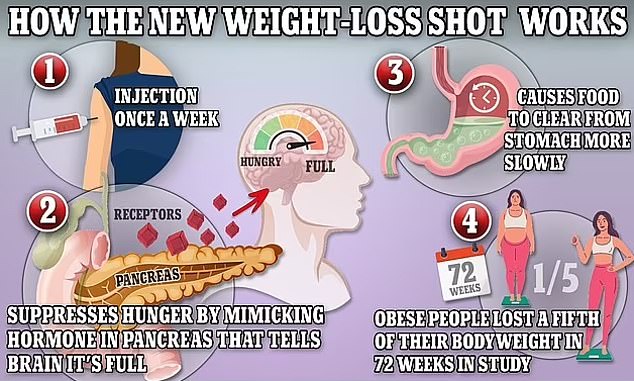Hoping to get Mounjaro into the NHS? Millions of people could miss out on King Kong’s weight loss jab because of BIG mistake by health chiefs, experts say
Millions hoping to get King Kong weight loss jab Mounjaro on the NHS could have their hopes dashed as a result of the glacial NHS rollout plan, experts have warned.
Health chiefs announced yesterday that 250,000 obese patients a year will be given the drug, which could help dieters lose up to a fifth of their body weight.
But experts have told MailOnline entry criteria were ‘very tight’ and the proposed timeline was ‘too slow’.
Obesity treatment expert Prof Alexander Miras of Imperial College London said double that amount should be offered annually to avoid desperate dieters being driven to expensive private clinics or risky black market versions.
He said, ‘I I appreciate that the NHS is under-resourced, but I don’t agree with the timeline – the number of people they want to treat is too slow.
Under current guidelines, only people with type 2 diabetes who cannot control the condition are eligible for Mounjaro through the health service
‘We should be looking at double the number they are proposing because of the very high demand for these drugs.
‘They have prioritized people with health complications to get the medication first, which is very reasonable.
‘But only those with a BMI (body mass index) of 40 or more will get it.
‘It should depend purely on the complications of the disease, and not on BMI.’
Nearly one in three adults in England are obese – with a BMI over 30 – while two-thirds are overweight.
In June, the World Health Organization warned about dangerous fake weight loss shots found in many countries, including Britain.
In some cases, counterfeits have been found to contain toxic ingredients – and there have been numerous reports of British users becoming extremely unwell and even dying after using dodgy jabs.
The black market emerged amid a surge in demand and resulting widespread shortages of weight-loss pills, including Ozempic and Wegovy.
The hope was that the rollout of Mounjaro would alleviate this, but Dr Simon Cork, senior lecturer in physiology at Anglia Ruskin University, told MailOnline that the criteria for access to the drug are ‘very strict, especially in the first phase’.
He added: ‘This will only include a very small number of patients but highlights the pressure are also likely to have access to this drug.”
However, others suggested the staggered rollout was just a result of ‘NHS cost constraints’.
Professor Naveed Sattar, an expert in cardiometabolic medicine at the University of Glasgow, told MailOnline: ‘The phased rollout is only a reality of the current costs of the drugs, given the cost constraints of the NHS.
‘There are better ways than setting a BMI of over 40 as the first limit people who need it most, but it is simple and easy to understand.
‘We have to start somewhere and we will see increasingly appropriate use of these weight loss medications over time, which will benefit the significant number of people who really need sustainable weight loss.’
Tirzepatide works by suppressing two appetite-regulating hormones (GLP-1), helping people feel full longer and have fewer food cravings.
The shot should come in a four-dose pen, which will provide a month’s worth of treatment if used once a week, Nice said.
It was previously only available in single doses.
Mounjaro is expected to provide an alternative to Wegovy – or semaglutide – which is also in short supply due to overwhelming demand.
However, experts warned that private demand for the jab could put “pressure” on domestic supplies and called on the drug’s manufacturer, US pharmaceutical giant Eli Lilly, to increase them.
Dr. Carel Le Roux, a consultant in metabolic medicine at Imperial College Healthcare NHS Trust, told MailOnline: ‘We need to put more pressure on companies to increase supply.

According to the latest data, digestive problems were the most commonly reported side effects of tirzepatide, Mounjaro’s active ingredient. About one in five participants suffered from nausea and diarrhea, and about one in ten reported vomiting or diarrhea

Some Americans are already using it ‘off label’. One of them is Matthew Barlow, a 48-year-old health technology executive living in California, who said he has lost more than 100 pounds (50 kg) since November 2022 by taking Mounjaro and changing his diet.
‘We need to treat more patients to achieve optimal health for the NHS.’
Meanwhile, Professor Richard Holt, an expert in diabetes and endocrinology at the University of Southampton, told MailOnline: ‘I am not surprised by the demand in the NHS and private sector.
‘The disruption in the supply of GLP-1 receptor agonists over the past year has caused concern for both people with diabetes and healthcare professionals.
‘It is never good when people have to stop treatment or change treatment due to supply problems. So far, Eli Lilly has successfully managed the launch of Mounjaro in Britain to reduce the chance of a shortage.
‘However, the NHS’s proposed rollout of Mounjaro for obesity will further increase demand, which could put pressure on supply.’
Patients in the US can already get the weight loss jab ‘off-label’ from some doctors, with many sharing their incredible transformation.
One overweight man claimed the drug helped him lose up to 100 pounds (45.4 kg).
Before-and-after photos show the transformation of Matthew Barlow, a 48-year-old health technology executive living in California.

He started taking the drug last November. At the same time, he also changed his diet and lifestyle as recommended.
‘Psychologically speaking, you don’t want to eat. Now I can eat two bites of dessert and be satisfied,” he said.
But like all medications, Mounjaro is not without side effects.
The MHRA has warned that the drug may affect the effectiveness of the contraceptive pill in obese or overweight female patients.
Other possible side effects include nausea, diarrhea, vomiting – which usually goes away with time – and constipation.
Low blood sugar is also “very common” in patients with diabetes, the agency added.
A study of 900 participants also found that a fifth suffered from nausea and diarrhea, and around one in ten reported vomiting or constipation.
Other people who used the drug outside of clinical trials have reported experiencing hair loss while taking Mounjaro.
A link has also been suggested with an increased risk of cancer from the jab.
The European Medicines Agency said this year that research in rodents has suggested that the artificial hormones packed into tirzepatide could increase the risk of medullary thyroid cancer.
